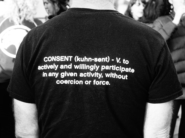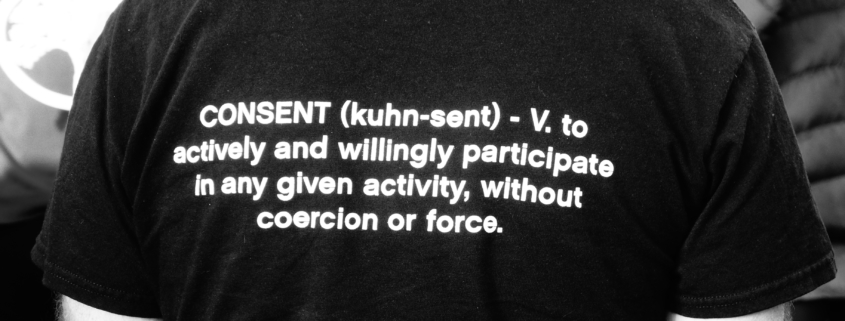Pause
All names and identifying data have been changed to protect privacy.
In the four months since I was assaulted, I have managed to put together one poorly constructed, grim poem about a water bug and one song to accompany instruments I lack the talent to play. Today, in writing this, I am breaking ground, grasping for the solace writing has brought to my life over the last two decades.
On February 15th, 2017, I moved into a studio; the first apartment I have ever been able to claim as my own. My prior lease was not due to end until late March but in order to escape a toxic living situation, I scraped up enough cash to shell out a rent payment on both places while I transitioned. The Wednesday I walked into my new space, adorned with a bright purple door, I felt safe for the first time in several years. This was my sanctuary. I was home.
* * *
Bryan was a friend of mine who went back to uniform-clad middle school days in the suburbs. I remember when he arrived at our school. New. Quiet. Awfully scruffy for a thirteen-year-old boy. We knew of each other, but it wasn’t until high school that we began to build a bond. An integral part of my life from fourteen to eighteen, Bryan dated several of my friends during that time. He was funny and charismatic. He was the life of the party. One to defend me from myriad unkind words from unkind friends. One of the first to make me feel beautiful. My best friend and I emblazoned his name on a set of handmade t-shirts: “I love my boys” in bold letters.
Bryan was an alcoholic.
It had been more than five years since Bryan and I had seen each other, but we’d been talking for a few months when we decided to go on an actual date. He had drifted apart from our group years ago, gotten into a relationship, and subsequently had a child of his own. We were both relatively new to the dating world—damaged, and intensely bonded by our past together. He was my friend and I trusted him. I felt safe and I was eager for the opportunity to reconnect face-to-face.
* * *
On the Saturday after I moved into my new apartment we planned our first date. Bryan texted me to ask if he could leave his car at my complex so we could catch an Uber to dinner, just in case we had something to drink. This sounded logical to me. I agreed. When he stepped out of his truck to greet me, it became obvious just how much time had passed. His hair was thinner. Beard longer. His demeanor seemed calmer, cooler.
 The last time I had seen him was at a friend’s party. He tried to kiss a good friend of mine in front of her boyfriend and narrowly avoided a stone cold KO. The same night, while he sprawled on a bathroom floor in a pool of sweat and vomit, Bryan attempted to buy weed off my ex. I deemed this an all-time low; but we were older now. We had moved on. I embraced the memories of him as a kind friend from high school. Blocked out the dark bits. The fights. The temper. The late-teen DUI. I chose to focus on the new Bryan—full of adoration, thoughtful texts, and who met me with a stunning pot of pink flowers as a housewarming gift the evening we reunited.
The last time I had seen him was at a friend’s party. He tried to kiss a good friend of mine in front of her boyfriend and narrowly avoided a stone cold KO. The same night, while he sprawled on a bathroom floor in a pool of sweat and vomit, Bryan attempted to buy weed off my ex. I deemed this an all-time low; but we were older now. We had moved on. I embraced the memories of him as a kind friend from high school. Blocked out the dark bits. The fights. The temper. The late-teen DUI. I chose to focus on the new Bryan—full of adoration, thoughtful texts, and who met me with a stunning pot of pink flowers as a housewarming gift the evening we reunited.
We caught a ride to a downtown noodle joint. On our way there, we talked about our busy work schedules; how happy we were to escape for a minute together. We giggled. It felt natural. It felt healthy.
At dinner I ordered a Moscow mule. I’m not much of a drinker, but it’s my go-to when I’m overwhelmed by unrecognizable lists of complex cocktails. Over the course of our meal, he matched my one drink with three of his own. Still, I recognized the face looking back at me. If he was drunk how could he be so composed, intelligent, and calm?
When we got back to my place, I walked Bryan to his truck. Rather than getting in, he reached along the passenger seat floor and grabbed a bottle of vodka, slugged back a large gulp and casually started to walk back to my apartment. Although I’d enjoyed myself on our date, I knew I wanted to be alone in my home. This moment was the first time that evening when fear stampeded my instincts.
Despite my discomfort, I convinced myself I was safe. His drinking was heavier than most individuals I normally spent time with, but he seemed coherent. Bryan took down the vodka and chased it with wine. I sat on the couch and he sat at my desk chair, playing me music. I assumed that my trepidation stemmed from the fact that I wasn’t used to dating. My last first date was nearly a decade ago. What did I know? Maybe this was all normal.
We had been talking and listening and drifting from subject to subject when the name of an old friend came up. He struggled to retrieve memories. My stomach began to turn. Minutes later he would inform me he hardly remembered a former girlfriend he dated for more than a year. More pain. More knots. Sensing his level of intoxication, I conceded to his suggestions that he needed a safe place to stay for the night. He was supposed to be up early for work. I figured he could lie on the couch and quietly sleep off his cocktails. I dreaded the damage he could do on the road, yet I was blind to the magnitude of destruction he was about to bring to my place of shelter.
As it got late, I retreated to my walk-in closet, closed the door and attempted to put on the least alluring outfit I could throw together—full leggings and an oversized t-shirt. Subconsciously, I craved armor. I quieted the fear inside of me and pulled off my blouse. Within seconds, Bryan had opened the door and made his way in.
* * *
 Before I hit puberty, I was thoroughly versed in the world of dissociation. I was abused by a close family member from as far back as my memory attempts to press until I was eleven-years-old, when the police came. My grandmother’s husband at the time would slink into my room, haul me away, find any excuse he could to come consume the little bits of innocence left inside of me. Fear told me I could not tell anyone. Fear pinned me down. Fear cut screams from my vocal chords. Fear has yanked years of memories from my mind. In all of the times I want to scream and run I can feel the tight grasp of hands pinning my limbs, bracing tightly around my lips, leaving me dormant and silenced. In those moments, I am gone.
Before I hit puberty, I was thoroughly versed in the world of dissociation. I was abused by a close family member from as far back as my memory attempts to press until I was eleven-years-old, when the police came. My grandmother’s husband at the time would slink into my room, haul me away, find any excuse he could to come consume the little bits of innocence left inside of me. Fear told me I could not tell anyone. Fear pinned me down. Fear cut screams from my vocal chords. Fear has yanked years of memories from my mind. In all of the times I want to scream and run I can feel the tight grasp of hands pinning my limbs, bracing tightly around my lips, leaving me dormant and silenced. In those moments, I am gone.
In an article by Leon F. Seltzer of Psychology Today, he wrote about the freeze response: “If you can’t make the assailant disappear, you’re much better off ‘disappearing’ yourself, by blocking out what’s much too scary to take in. So, in its own way, the freeze response to trauma is—if only at the time—quite as adaptive as the fight/flight response.”
On February 18th, 2017 I was paralyzed by fear, exhaustion, and terror. I disappeared. Bryan spent four excruciating hours pushing, pressuring, biting, pressing, dragging, forcing my body into places it did not belong. As the night progressed, the pain became insurmountable. Four hours in, I lay frozen and dissociated. He told me to “stop being weird.” I lay still, begging and pleading to myself to find strength. Asking a higher power to come and save me, to make minutes and hours pass more quickly than possible.
In the morning, after Bryan slept through alarms and refused to move from my bed, I stepped out into the hallway and called two of the people I trusted most. I sobbed, inconsolably—my body covered in bruises, jaw unable to open entirely, eyes swollen shut. I threw Bryan’s clothes on his chest and commanded him to leave. I felt utterly broken.
I forgot how to be human.
I forgot to breathe.
I forgot how to write.
I froze, again.
* * *
There are few things in my life that I can take a pause from. I have always been a champion for stretching too thin, grasping to embrace all experiences. Juggle. Hustle. Do it all. Squeeze out every last drop of time and sanity. In the last term of my undergrad degree I worked full-time, took twenty-one credit hours, and gave birth to my daughter. I am uneasy in the calm that many find comfort in. I can be neurotic; I’d like to call it relentless.
When my life came crashing down this February, the angels at Antioch University immediately said, “You need to take care of yourself.” The program coordinator helped me process paperwork to enter an enrollment maintenance semester when my brain was mush. Steve Heller, our MFA chair, called to speak with me directly, providing sincere compassion in the weeks after my assault. He kindly allowed me to remain a part of Lunch Ticket, my family and my consistency for the last year and a half. Once again, this program saved me and I finally allowed myself to slow, to pause.
Pause.
I am learning to pause.
I am learning to forgive myself for taking a break when I had to learn how to function again. I am still learning to function.
I am learning to set boundaries. To not lose myself in the blame. To ask for answers when others hurt me. To show myself compassion. To own the accusations from those who tell me I’ve changed. Yes. Yes, I have.
As writers, there comes times in our lives where it is necessary to pull back, care for ourselves. We are simply human and that fact will never diminish our identity as writers.
No, I haven’t written much lately. Yes, I have focused on me. Yes, I can forgive myself.
But I am here now. Yes, it counts for something.

Doni Shepard is a poet, mother, and lifetime learner currently residing in Phoenix. She spends her days managing content for a popular startup, mommying an extraordinary three-year-old, and serving on Lunch Ticket. Upon nightfall you can generally find her in an insomniac haze binge-watching streaming television with a fluffy orange feline named Doobie James. Her work has been featured online by Dirty Chai, Bloodletters Literary Magazine, Calamus Journal, Crab Fat Magazine, The Thought Erotic, and Ursus Americanus Press, and may be found in the love anthology Spectrum 3: LoveLoveLove. She holds an undergraduate degree in Interdisciplinary Studies with a concentration in art therapy from Arizona State University and is currently an MFA candidate at Antioch University Los Angeles, concentrating in poetry.





